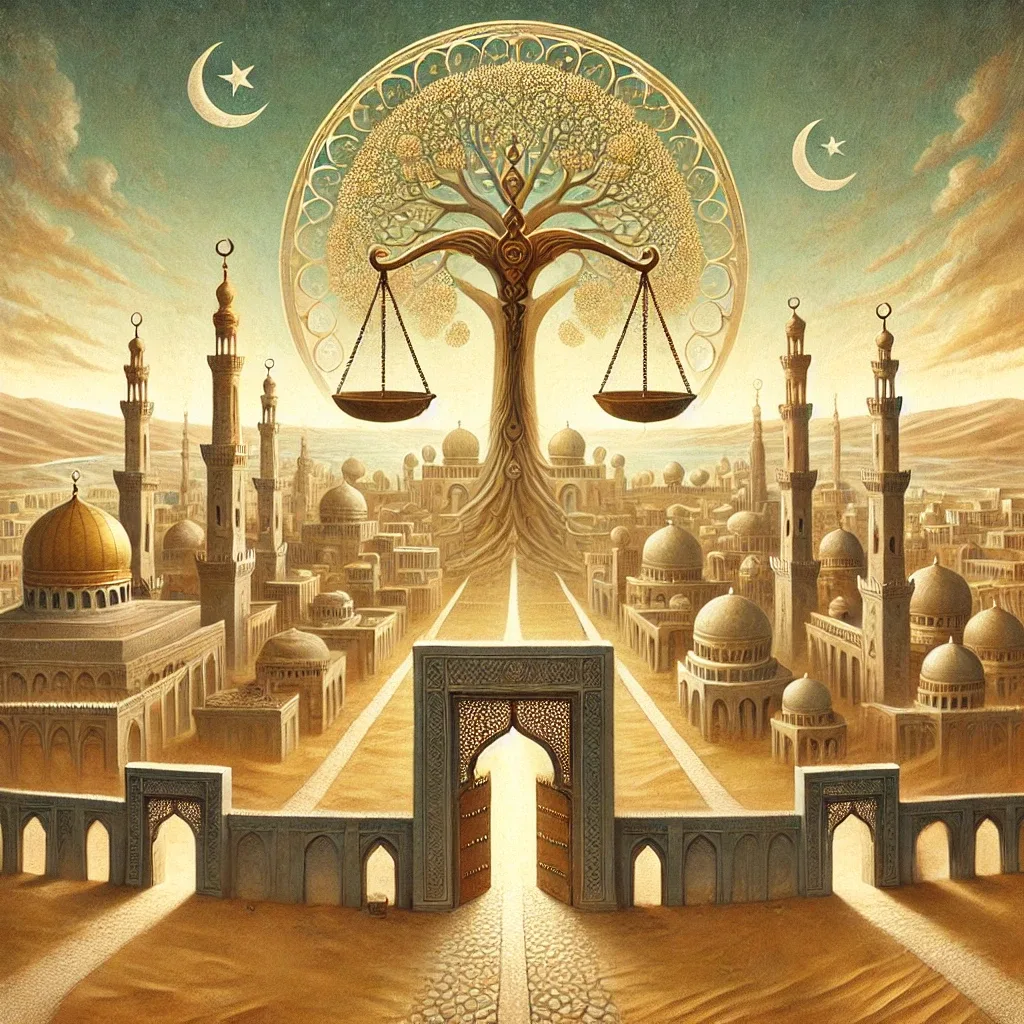Table of Contents
Introduction
The twelfth article in the series the “Era of the Rightly Guided Caliphs“ highlights the distinctive historical achievements and miracles associated with each of the four caliphs. It covers Abu Bakr, who turned a vulnerable state into a powerful empire in just two years; Umar, who governed a vast realm with fairness; Uthman, who gave his life to protect the unity of the ummah; and Ali, known for his remarkable generosity, even towards his adversaries. Click here to read the full series.
The Foundation of the Righteous Caliphs’ Historical Legacy
Today, we focus on the unique historical legacy of the Rightly Guided Caliphs and the remarkable achievements that set them apart in history. Each of these caliphs performed feats that remain unprecedented among rulers throughout time. Their individual contributions should inspire us to make our own mark in our respective fields, affairs, and domains—an accomplishment that can only be realized through unwavering determination.
The foundation of the historical miracles of the Righteous Caliphs lies in their deep connection to the Prophet Muhammad (Peace be upon Him). They were His disciples, His companions, and the most devoted followers of His teachings and traditions. The life of the Prophet represents the greatest success story in human history, unmatched by any other figure. Even the renowned American researcher Michael Hart, in his book The 100: A Ranking of the Most Influential Persons in History, placed the Prophet Muhammad (Peace be upon Him) at the top of his list.
Hart, despite being Christian, explained his choice, stating:
“My choice of Muhammad to lead the list of the world’s most influential persons may surprise some readers and may be questioned by others, but He was the only man in history who was supremely successful on both the religious and secular levels. Of humble origins, Muhammad founded and promulgated one of the world’s great religions, and became an immensely effective political leader. Today, thirteen centuries after his death, his influence is still powerful and pervasive“
Numerous other similar quotes from non-Muslim Western scholars echo this sentiment, affirming that the Prophet (Peace be upon Him) represents the most significant human success story in history. The key point here is that the historical excellence of the Righteous Caliphs originated from the life and guidance of the Prophet. Their extraordinary achievements were made possible by the divine revelation and the message they carried. Without the Prophet Muhammad (Peace be upon Him), none of them would have attained what they did, whether in worldly success or spiritual accomplishment.
Virtue, Integrity, and Unity: The Distinctive Qualities of the Righteous Caliphs
The Rightly Guided Caliphs collectively displayed remarkable historical achievements. Despite ruling over a vast empire, they remained committed to faith, asceticism, and humility. None of them sought personal gain from their position, and there was no suspicion or accusation of financial corruption or misuse of power. They led with integrity, never exploiting their roles as heads of an empire that spanned from east to west, gathering the world’s resources.
In addition to their personal virtues, the Righteous Caliphs also maintained a deep respect for one another, which stands in stark contrast to the typical behavior of rulers who often try to diminish the achievements of their predecessors in order to establish their own legacy. The Caliphs, however, valued and honored each other. For example, Umar spoke of Abu Bakr, saying, “If the faith of the entire ummah were weighed against Abu Bakr’s faith, Abu Bakr’s faith would outweigh it“.
Uthman praised Umar, saying, “Who can bear what Umar bore?” And Ali, in defense of his predecessors, declared that anyone who claimed superiority over Abu Bakr and Umar should be punished for slander, even threatening to flog such individuals. In fact, when someone insulted Abu Bakr or Umar, Ali took it so seriously that he considered executing them.
The Rightly Guided Caliphs embodied virtues of faith, humility, and asceticism. They respected one another deeply and recognized each other’s contributions. As the saying goes, “Only those of virtue can recognize the virtue of others“.
Humility, Ethical Governance, and Consultative Leadership of the Righteous Caliphs
The Rightly Guided Caliphs were exceptional among historical rulers in that, despite governing an expansive state, they never adopted the trappings of kingship. There were no royal luxuries, scepters, or displays of extravagance. They lived simple lives, governing from the mosque, leading prayers, and remaining open and accessible to anyone who wished to speak to or challenge them. In fact, three of the Caliphs—Umar, Uthman, and Ali—were martyred by their opponents, two of them—Umar and Ali—while praying in the mosque, and Uthman in his own home.
Even though they ruled over a vast empire, the Rightly Guided Caliphs remained approachable. They were not distant from the people, nor did they surround themselves with the typical symbols of power such as veils, gatekeepers, servants, and entourages. They governed nearly a third of the known world at the time, yet maintained their humility.
What set them apart was their unwavering commitment to ethical governance. Unlike other rulers, who were often focused on self-aggrandizement, profit, and the expansion of power, the primary goal of the Rightly Guided Caliphs was the establishment and preservation of the religion. They prioritized the faith above personal interests, even when it meant sacrificing their own rights or well-being.
Despite their significant authority, the Rightly Guided Caliphs were highly consultative with those around them, particularly the companions and followers. They were open to differing opinions, and would abandon their own views if it became clear that an opposing perspective was more valid. In this way, their rule stands in stark contrast to other historical empires, marked by these distinctive characteristics of humility, ethical leadership, and consultation.
Abu Bakr’s Unmatched Leadership: Transforming a Threatened State into a Global Superpower
When we examine each of the Rightly Guided Caliphs and their unique historical legacies, one stands out remarkably: Abu Bakr (may ALLAH be pleased with him). His historical miracle lies in the fact that he was the only ruler in history to take charge of a state on the brink of invasion and, within just two years, transform it into a global superpower. This achievement is unparalleled—no one in history has assumed leadership of a state under immediate threat, with its capital at risk, and then left it as a dominant global power in such a short time.

Great historical figures, such as state founders or heroes, typically accomplish one of several feats: they transform a weak and unstable state into one of security and stability, or they take a stable state and elevate it to strength, or from strength to superpower status. Those who achieve any of these are counted among the greatest leaders and founders of history. These transformations usually take decades—ten, twenty, or even fifty years. And while such lengthy periods don’t diminish their greatness, they highlight the exceptional nature of Abu Bakr’s accomplishment.
What makes Abu Bakr’s achievement even more extraordinary is that he accomplished this feat in just two years, taking the state from a position of vulnerability to superpower status without compromising the foundations laid during the Prophet’s (Peace be upon Him) time. His unwavering commitment is reflected in his words: “By ALLAH, if they withhold even a camel’s rope that they used to give to the Messenger of ALLAH, I will fight them over it“.
Under his leadership, he dispatched eleven armies to quell apostasy, reunifying the Arabian Peninsula. By the time of his death, one of his armies was engaged in the conquest of Iraq, facing the ancient Persian Empire, while another was advancing in the Levant, confronting the Roman Empire.
When we consider the biographies of other great historical rulers—Cyrus, Ramses II, Alexander the Great, Napoleon, Bismarck, Lenin, Mao Tse-tung—none of them achieved the historical miracle that Abu Bakr did.
Umar ibn Al-Khattab: The Justice and Mercy Behind Unprecedented Conquests
The historical miracle of Umar ibn Al-Khattab (may ALLAH be pleased with him) lies in his exceptional ability to govern a vast empire, which at its height encompassed one-third of the known world, with unparalleled justice. Typically, rulers who controlled such vast territories resorted to massacres, bloodshed, and cruelty, often targeting civilians, including children, women, and the elderly. Their rule was driven by a colonial mindset—seeking to plunder resources, enrich their states, and expand their political and economic power at the expense of the conquered peoples.

However, Umar, despite conquering these vast lands, was known as one of history’s most just rulers. It is common for historians to overlook or even forgive the atrocities committed by rulers during territorial expansions, treating them as necessary for achieving political dominance. Few biographies of emperors, kings, or leaders who expanded their empires speak of justice toward the conquered people. Instead, historians often accept massacres as a regrettable but inevitable part of conquest.
Umar, in contrast, set an exemplary precedent by ruling a vast empire with fairness and integrity. His conquests, especially during his era of rapid territorial expansion, were marked by respect for those he governed. His conquest of Jerusalem, in particular, stands out as a remarkable achievement. It is the only conquest in the city’s history that proceeded with peace, security, and mercy toward its inhabitants.
The conquest of Jerusalem is often compared to other military campaigns, and even non-Muslim historians and orientalists have expressed admiration for Umar’s leadership. Karen Armstrong, a British historian of Jerusalem, devoted a chapter to the Umari conquest, describing it as unprecedented in the city’s history. Michael Hart, whom we mentioned earlier, also included Umar in his list of the most influential people in history. Hart highlighted that without Umar’s vast conquests, the spread of Islam would not have been as widespread, and the regions he conquered remain Muslim to this day.
Uthman ibn Affan: Sacrifice, Leadership, and Preserving the Unity of the Muslim Ummah
Uthman ibn Affan (may ALLAH be pleased with him) shares with Umar ibn Al-Khattab the distinction of ruling a vast empire with justice. However, what sets him apart is his willingness to sacrifice his own life to preserve the unity of the Muslim community and prevent rebels from seizing control of the caliphate. Uthman could have defended himself and his empire—an empire that encompassed one-third of the known world at the time—but he chose to protect the system and uphold the will of the people.
To summarize what transpired during Uthman’s reign: he ruled for twelve years, with the first ten years being peaceful and prosperous. However, the last two years of his caliphate were marked by rebellion. This rebellion began with secretive movements and was fueled by social and economic grievances. The rebels, dissatisfied with Uthman’s rule, eventually gathered in Medinah and demanded that he abdicate. The very notion of abdication was something unthinkable in the ancient world. In the realms of Persia, Rome, or even among the Arab tribes, no one would dare to demand that their ruler step down. The very idea of abdication is one of the historical miracles and progressive ideas introduced by Islam.
When the rebels came to Uthman and presented their grievances, he listened to their arguments and responded with explanations and justifications. In some cases, he sought to resolve the issues by removing certain governors or reinstating individuals who had previously been punished. Yet, the rebels remained insistent: either he abdicate or face death.

In this critical moment, Uthman made a decision that stands as a historical miracle for a ruler of a vast empire. He chose to preserve the system, the established state structure, rather than allow a group of rebels—even if they numbered in the thousands—to overturn the community’s decision and usurp the authority of a caliph who had been legitimately pledged allegiance to. Uthman’s decision to uphold the community’s will, despite the personal risk to his life, exemplified his commitment to the unity of the Muslim ummah and the integrity of the caliphate system.
While Uthman ibn Affan remained firm in preserving the will of the community, he also understood the gravity of the situation and sought to avoid bloodshed in Medinah. Faced with the rebels’ demand for his abdication, he made a profound decision: he would not step down from the caliphate, but he would also not allow a war to erupt in his defense. His choice was to sacrifice himself rather than incite conflict, even though he had every right to defend his position.
Uthman’s reasoning was clear: he ensured that no enemy or troublemaker would take power after him. Had there been a real threat that one of these rebels, or an enemy of Islam, might take control of the caliphate, Uthman would not have made the same choice. His priority was the preservation of the system, the unity of the community, and the stability of the state, even at the cost of his own life.
Among the rebels, some favored Ali, while others supported different figures. In the end, the matter would not go beyond choosing one of the Prophet’s companions—men who were well-respected and whom the Prophet (Peace be upon Him) had been pleased with. Figures such as Ali, Talha, Zubayr, Sa’d ibn Abi Waqqas, and others from the consultation committee were all considered qualified to lead. Thus, Uthman did not fear for the future of the community, knowing that whichever companion was chosen would lead with righteousness and integrity.
This was the decision of Uthman (may ALLAH be pleased with him): to preserve order and unity, choosing to sacrifice himself rather than allow war to break out in Medina. He refused to let a single drop of blood be shed in his defense. This act of selflessness is something rarely seen in history, especially among emperors who ruled vast empires. Such rulers could have easily crushed rebellious forces and sparked a war that would have wiped them out.
Ali ibn Abi Talib: Generosity, Justice, and Resilience in the Face of Division
Ali ibn Abi Talib’s (may ALLAH be pleased with him) historical miracle lies in his unmatched generosity, even toward those who opposed him and ultimately took his life. As the fourth of the Rightly Guided Caliphs, Ali received legitimate allegiance in Medinah and was endowed by ALLAH with profound knowledge and exceptional horsemanship, equipping him to face the internal strife that arose within the Islamic community.
Ali confronted the Kharijites, who had rebelled against him, and also engaged with certain factions of Shiites who exaggerated in their reverence for him, even deifying him. Additionally, he fought against some companions whose actions, though stemming from good intentions, led to the division of the Muslim community, as their interpretations diverged from the correct path.
Despite the tensions and conflicts he faced, Ali’s generosity toward his opponents remained extraordinary. In all the battles he fought, he issued clear orders to ensure the dignity of his adversaries. He commanded that no wounded enemy be killed, that retreating fighters not be pursued, and that only those who actively fought against him be engaged in combat. He forbade the division of property or the taking of women and children as captives. In this way, Ali demonstrated a level of magnanimity and respect for his opponents that was remarkable, even in times of war.

Ali ibn Abi Talib’s historical miracle is exemplified in his treatment of those who opposed him, particularly those who exaggerated their reverence for him and deified him among the Shiites. When they claimed divinity for him, Ali punished them harshly, even resorting to burning some of them with fire. He also pursued those who insulted his predecessors, Abu Bakr and Umar, declaring: “No one who claims I am superior to Abu Bakr and Umar will be brought to me except that I will flog them with the punishment for slander“.
Yet, this same Ali, when faced with the Kharijites—who had rebelled against him, declared him an unbeliever, and caused unrest—still preserved their rights. Despite their accusations, Ali said: “You have three rights over us: we will not prevent you from the spoils of war, nor from entering the mosques“. As long as they did not commit crimes against Muslims, he ensured their security and upheld their rights.
Consider the magnanimity of Ali ibn Abi Talib in preserving the rights of those who had declared him an unbeliever and fought against him! When asked if they were unbelievers, he replied, “From unbelief, they fled“. When asked if they were hypocrites, he responded, “Hypocrites rarely remember ALLAH, while these people remember ALLAH frequently“. And when asked how to categorize them, he simply said, “They are people who transgressed against us, so we fought them“.
Ali’s conduct in this regard is exceptional. He protected the rights of those who opposed him while being strict and uncompromising with those who excessively venerated him. In contrast to the norm in history, where rulers typically honored those who flattered them and fought mercilessly against their enemies, Ali showed the highest moral conduct.
Inspiration, Dedication, and the Pursuit of Excellence: Lessons from the Righteous Caliphs
Each of the Righteous Caliphs left a significant mark in history, and this should inspire us to make our own contributions in our respective fields. Whether it’s the scholar excelling in knowledge, the warrior in his struggle, or the politician in his work, every domain offers an opportunity to leave a lasting impact. However, such achievements require immense effort. As the poet wisely said:
“According to the determination of the resolute come the resolutions,
And according to the noble come the noble deeds,
Small things appear great in the small one’s eye,
While great things appear small in the great one’s eye“
Another poet reflected:
“I’ve seen man is but the son of his endeavor,
So he who strives more is more worthy of glory,
Through lofty ambition, one rises to the heights,
So he of higher ambition becomes more prominent,
Never has one who sought progress regressed,
Nor has one who sought regression progressed“
I ask ALLAH the Almighty to teach us what benefits us, to benefit us by what HE has taught us, and to increase us in knowledge.
Sources:
- Mohamed Elhamy. محمد إلهامي | عصر الخلافة الراشدة | 12. البصمة التاريخية للخلفاء الراشدين. YouTube Video.

